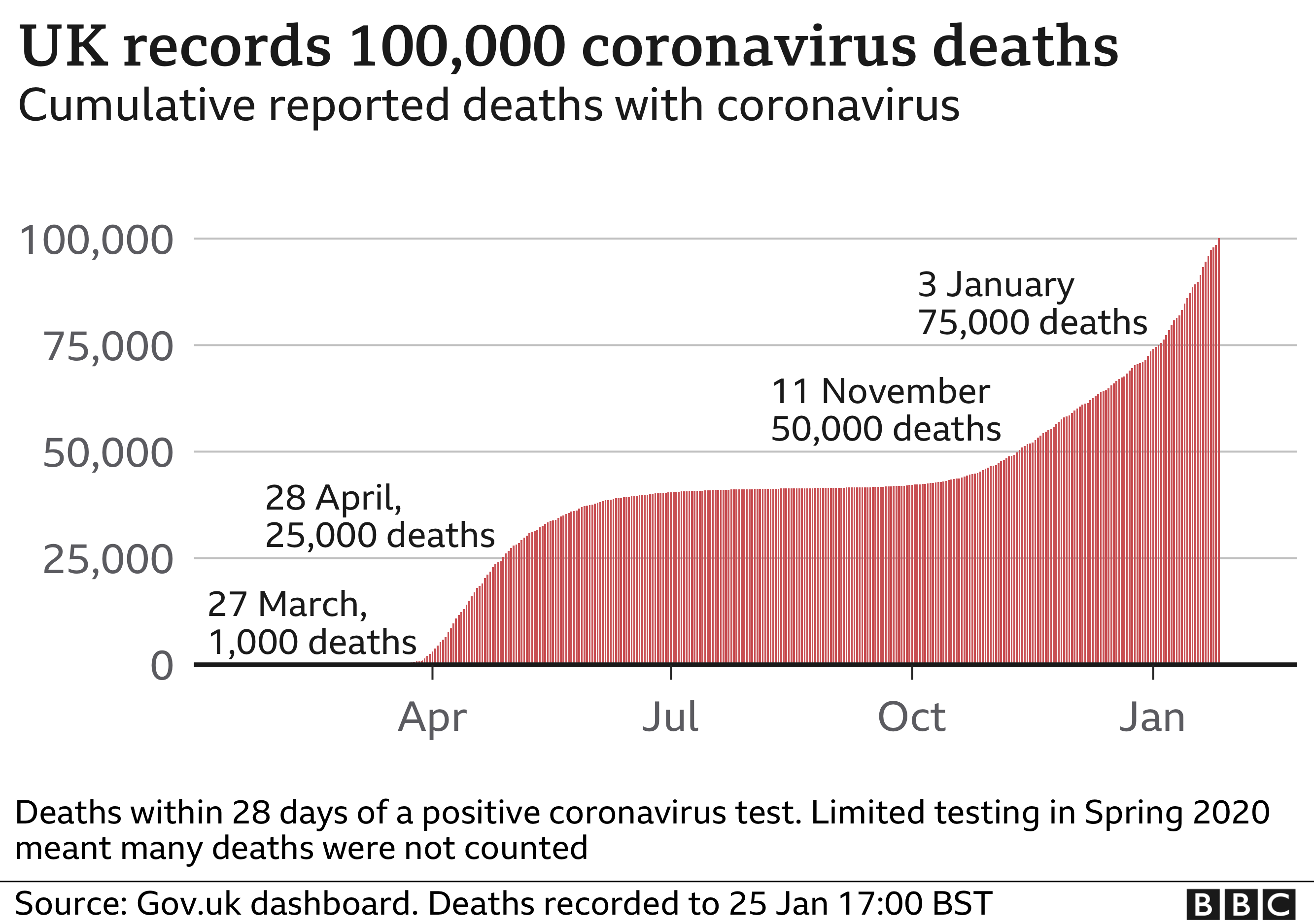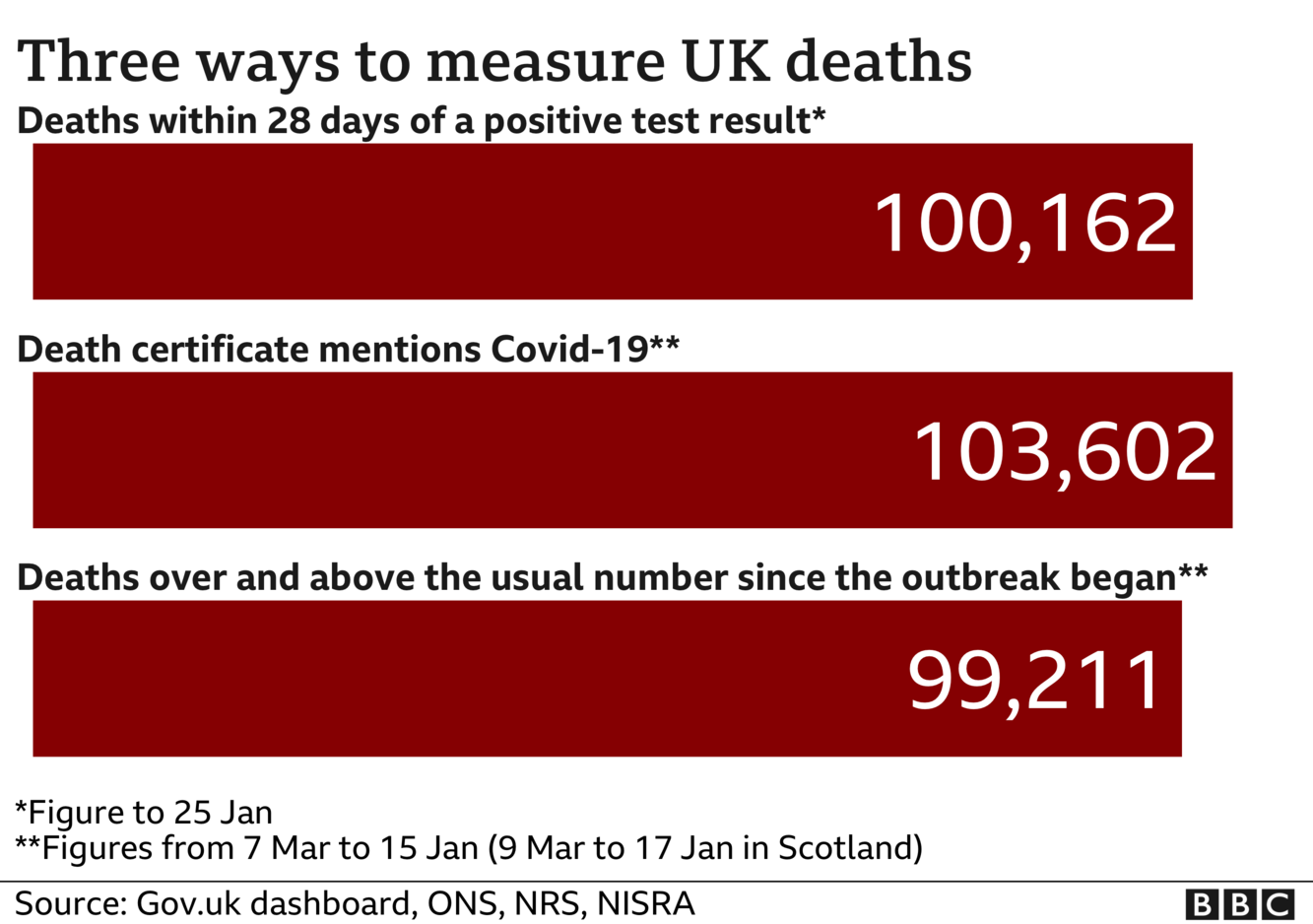More than 100,000 people have died with Covid-19 in the UK, after 1,631 deaths within 28 days of a positive test were recorded in the daily figures.
Prime Minister Boris Johnson said he took "full responsibility" for the government's actions, saying: "We truly did everything we could."
"I'm deeply sorry for every life lost," he said.
A total of 100,162 deaths have been recorded in the UK, the first European nation to pass the landmark.
Earlier, figures from the ONS, which are based on death certificates, showed there had been nearly 104,000 deaths since the pandemic began.
The government's daily figures rely on positive tests and are slightly lower.
Mr Johnson told Tuesday's Downing Street press conference that it was "hard to compute the sorrow contained in this grim statistic".
He said he offered his "deepest condolences to everyone who's lost a loved one", saying: "Fathers and mothers, brothers and sisters, sons and daughters, and the many grandparents who've been taken."
The UK is the fifth country to pass 100,000 deaths, coming after the US, Brazil, India and Mexico.
It follows a surge in cases last month, leaving the UK with one of the highest coronavirus death rates globally.
A further 20,089 coronavirus cases were recorded on Tuesday, continuing a downward trend in the number of UK cases seen in recent days. The number of people in hospital remains high, as do the UK's daily death figures.

Mr Johnson said the coronavirus infection rate remained "pretty forbiddingly high" to ease lockdown restrictions - which have been in place in England since 5 January.
But he said "at a certain stage we will want to be getting things open".
"What I will be doing in the course of the next few days and weeks is setting out in more detail, as soon as we can, when and how we want to get things open again."
Under the national lockdown, people in England must stay at home and only go out for limited reasons - including for food shopping, exercise, or work if they cannot do so from home. Similar measures are in place across much of Scotland, Wales and Northern Ireland.


One day there will be a public inquiry - maybe several - seeking to understand why so many died.
Last summer, back when the government was subsidising people to eat out at restaurants, Boris Johnson said there would be an independent inquiry into the government's handling of Covid, but gave no details or dates.
He still hasn't, despite a recent call from bereaved families, trade unions and charities for lessons to be learnt now.
The gravest public health crisis for a century would have tested any government.
But as the pandemic has worsened the criticisms and questions have mounted - about the timing of lockdowns, the rollout of test and trace and the failure to protect care homes last spring.
There is now pressure on Boris Johnson from some Tory MPs to ease restrictions as soon as the most vulnerable are vaccinated.
But this evening a sombre prime minister said the government would first do everything it could to minimise further loss of life.

Speaking alongside the prime minister, Prof Chris Whitty, England's chief medical officer, described it as a "very sad day".
But he said the number of people testing positive for Covid-19 in the UK "has been coming down" and the number of people in hospital with Covid has "flattened off" - including in London, the South East and East of England.
However, there were "some areas" where the hospital figures were "still not convincingly reducing".
He said the number of people dying "will come down relatively slowly over the next two weeks - and will probably remain flat for a while now".
Prof Whitty said the new coronavirus variant had "changed the situation we're in very substantially", saying the data showed that "the rates are just about holding with the new variant with what everybody's doing".
NHS chief executive Sir Simon Stevens said there had been "continuing improvements in hospital treatment for severely sick coronavirus patients".
He said he expected more treatments within the next six to 18 months, adding: "We can see a world in which coronavirus may be more treatable, but for now, it's a combination of reducing infections and getting vaccinations done."


It's a terrible milestone - and one that represents unimaginable loss.
However you look at it, the UK has seen one of the highest death tolls in the world.
From death certificates, we know in nine out of 10 cases Covid is judged by doctors to be the cause of death, not just a contributory factor.
People are dying of the disease, not just with it.
What is also clear is that Covid has preyed on the vulnerable.
Three quarters of deaths have been among the over 75s. Just 1% have been in under 45s.
Those with underlying health conditions have been at particular risk.
Most of the deaths have come in two waves - the sharp, sudden surge in the spring followed by a slow and sustained rise throughout autumn and winter.
Mistakes have been made - the delay locking down back in March is one that is often cited even by the government's own advisers.
The UK, like much of Europe, was also woefully underprepared with limited testing and contact tracing systems.
But the ageing population, high rates of obesity, the fact the UK is a global hub and its inter-connectedness with Europe are also factors that meant we were tragically never going to escape lightly once the virus got a foothold.

Dr Yvonne Doyle, medical director at Public Health England, said it was a "sobering moment in the pandemic", saying: "Each death is a person who was someone's family member and friend."
"This virus has sadly taken millions of lives across the world, but we have learnt a lot about this coronavirus over the past year," she said.

Health Secretary Matt Hancock said it was "heartbreaking" that the UK's coronavirus death toll had passed 100,000 and warned there was a "tough period ahead".
"The vaccine offers the way out, but we cannot let up now," he said.
More than 6.8m people in the UK have had their first dose of a coronavirus vaccine, according to the latest figures.
Labour leader Sir Keir Starmer said it was a "national tragedy" to have reached 100,000 deaths.
The government had been "behind the curve at every stage" of the pandemic and had not learnt lessons over the summer, he added.

If you would like to send us a tribute to a friend or family member who died after contracting coronavirus, please use the form below.
Please remember to include a photo of your loved one and their name. Upload your pictures here. Don't forget to include your contact details, so we can get in touch with you.
We would like to respond to everyone individually and include every tribute in our coverage, but unfortunately that may not be possible. Please be assured your message will be read and treated with the utmost respect.
Please note the contact details you provide will never be published. Please ensure you have read our terms & conditions and privacy policy.
If you are reading this page and can't see the form you will need to visit the mobile version of the BBC website to submit your tribute.
https://news.google.com/__i/rss/rd/articles/CBMiJmh0dHBzOi8vd3d3LmJiYy5jby51ay9uZXdzL3VrLTU1ODE0NzUx0gEqaHR0cHM6Ly93d3cuYmJjLmNvLnVrL25ld3MvYW1wL3VrLTU1ODE0NzUx?oc=5
2021-01-26 19:10:00Z
52781331423001

Tidak ada komentar:
Posting Komentar